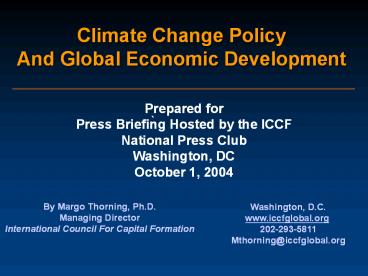By Margo Thorning, Ph.D. - PowerPoint PPT Presentation
Title:
By Margo Thorning, Ph.D.
Description:
GDP per capita (1995 $) Energy per GDP (Btu per 1995 $) Country ... Carbon Emissions Per Dollar/ Output. Impact of New Technologies on. Carbon Emissions ... – PowerPoint PPT presentation
Number of Views:22
Avg rating:3.0/5.0
Title: By Margo Thorning, Ph.D.
1
Climate Change Policy And Global Economic
Development
Prepared for Press Briefing Hosted by the
ICCF National Press Club Washington, DC October
1, 2004
By Margo Thorning, Ph.D. Managing Director
International Council For Capital Formation
Washington, D.C. www.iccfglobal.org
202-293-5811 Mthorning_at_iccfglobal.org
2
CO2 Reductions Required by 2050 Under 550 PPM
Scenario
3
U.S. Carbon Emissions Under the Baseline
Forecast and Under Alternative Emission Reduction
Targets
4
Economic Impact of Mandatory CO2 Reductions on
the U.S.
- Energy Prices Rise 2010 2020
- household electricity 31 43
- gasoline 23 31
- natural gas for industry 55 82
- Job Losses 250,000
610,000 - Household Income Falls 1300
2300 - State and Federal tax receipts decline.
- Low income and elderly bear large burden due to
higher energy costs.
5
If Eleven Northeast States Go it Alone, How Do
They Fare?
- Energy Prices Rise 2010 2020
- household electricity 35 39
- gasoline 39 44
- natural gas for industry 110 120
- Job Losses 192,000 218,000
- Household Income Falls 2600 3000
- State tax receipts falling 2.9 billion.
- Low income and elderly bear a large burden.
6
Where Does Europe Stand on Actually Complying
with Kyoto?
- European Union is projected to be 7.5 above the
1990 emission levels by 2010. - EU leaders realize they cannot reconcile goals
of increased EU industrial competitiveness as
well as tighter future targets for GHG emission
reductions. - EU policy-makers are beginning to worry about
the additional steps required to meet the targets
including the impact of emission trading schemes
on industry. - Recent credible analyses of impact on EU
economies has shifted terms of the debate.
7
Energy Intensity and Economic Freedom in
Developing and Emerging Economies
8
Energy Intensity and Economic Freedom in
Developed Countries
Carbon per GDP (MMTC per 1995 )
Freedom Index
GDP per capita (1995 )
Energy per GDP (Btu per 1995 )
Country
9
Carbon Emissions Per Dollar/ Output
Impact of New Technologies on Carbon Emissions
Million Metric Tonnes Carbon/Billion 1997
10
Practical Strategies to Address Economic Growth
and Climate Change Policy
- Remove barriers to developing worlds access to
more energy and cleaner technology by promoting
economic freedom and market reforms - Increase RD for new technologies to reduce
energy intensity - Develop sequestration through both natural and
man-made technologies - Promote nuclear power for electricity
- Expand bilateral cooperation with developing
countries - Promote a truly global solution































